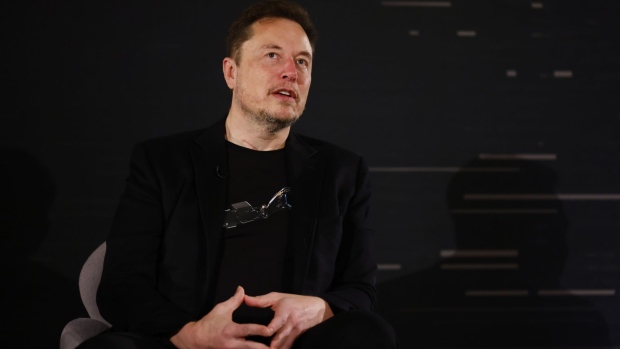Jan 30, 2024
Musk Disses Tiny Delaware After Its Court Zaps His Mega-Pay Plan
, Bloomberg News

(Bloomberg) -- Shortly after a Delaware judge voided Elon Musk’s $55 billion Tesla Inc. compensation package, the billionaire took to social media to vent his feelings: “Never incorporate your company in the state of Delaware.”
Musk’s sour sentiments about Delaware should come as no mystery given his costly legal setbacks in the First State. Musk was hit with a ruling Tuesday invalidating his 2018 pay package — the largest in US corporate history — after an investor claimed it was flawed by conflicts of interests and misleading disclosures by the electric-car company.
Delaware, the second-smallest US state, also is where Musk surrendered in his battle to renege on his $44 billion offer to buy social-media platform Twitter Inc., which the billionaire later renamed X. The company lost $25 billion in value after a year under Musk.
His clashes with the Delaware courts have prompted the serial entrepreneur to launch an attack on the state’s main industry – serving as corporate home to almost 70% of Fortune 500 companies. Incorporation fees generated more than $2 billion for the state in 2022, or about a fourth of its annual budget.
“Mr. Musk doesn’t like Delaware because he’s been held accountable there for his actions and he’s not used to that,” said Jill Fisch, a University of Pennsylvania law professor who teaches about corporate law and litigation. “The Delaware courts are known for being willing to regulate the actions of controlling shareholders when they get out line.”
Musk has manifested his distaste for Delaware to the point that when it came time to rename Twitter, he moved the company’s state of incorporation to Nevada, whose corporate laws offer more protections from investor suits against executives.
In another X post on Tuesday, Musk said states such as Nevada and Texas, where Tesla’s headquarters is located, are “better for letting shareholders decide” corporate-governance issues such as pay packages.
Other companies, including travel website TripAdvisor, want to follow X’s relocation to Nevada, but some TripAdvisor shareholders have sued to block the move, saying owner Greg Maffei wants to go to a state whose “race-to-the-bottom” corporate liability laws will harm investors.
X Poll
Musk also asked X devotees Tuesday to vote on whether he should shift Tesla’s incorporation papers to Texas, where he moved the company’s business operations in 2021. The state has just set up a business court in hopes of competing with its East Coast rival. Minutes into the survey, 90% of the 67,000 votes cast were in favor of the Texas move.
Musk’s ire hasn’t shaken Delaware’s grip on the US incorporation industry. By the end of 2022, more than 1.9 million businesses had chosen the state as their corporate home, far surpassing the state’s population, according to the office of the Delaware Secretary of State.
The state’s Chancery Court judges are recognized as business-law experts who can hear cases on a fast-track basis. Most high-profile merger-and-acquisition disputes are litigated in the state in non-jury cases. Even foreign companies come to the state to have corporate disputes decided.
Despite his comments, Musk has won some cases in Delaware, including suits brought by Tesla investors claiming his $2.6 billion acquisition of renewable-power provider SolarCity amounted to a bailout for the company, which was founded by Musk and his cousins. A judge ruled in 2022 that the billionaire didn’t improperly force fellow directors to accept an overpriced buyout of SolarCity, even though he criticized Musk for failing to properly remove himself from involvement in the deal.
Winning Streak
Later that year, Musk’s winning streak started to go south when he tried to back out of his bid to buy Twitter. He was repeatedly dealt setbacks in pretrial rulings by Judge Kathaleen St. J. McCormick – the same judge who would go on to write Tuesday’s ruling zapping his 2018 pay plan.
In one instance, over objections by his lawyers, McCormick ordered Musk to hand over information about his potential investors in the Twitter deal along with all people “with knowledge of or involvement in key issues and events” in the dispute over the acquisition. Musk eventually capitulated and agreed to the Twitter deal’s original terms.
That case highlights Delaware law’s power to force sophisticated business titans such as Musk to honor their agreements, said Charles Elson, a retired University of Delaware professor and founder of the school’s Weinberg Center for Corporate Governance.
“Delaware is known for its well-established corporate laws that emphasize a measured, rational approach to corporate-governance issues,” Elson said. “Entrepreneurs like Elon Musk are all about breaking rules and getting things done and they are very frustrated to have to be subject to such legal limitations.”
Tulane Law School Professor Ann Lipton sought to put Musk’s reaction to two devastating court defeats in context.
“From his point of view it cost him $90 billion,” she said. “I’d argue if not for Delaware’s entire system of corporate law, he’d never have had that money to begin with, but he doesn’t see it that way.”
And even though he’s down on Delaware, Musk still can’t completely escape the clutches of his corporate bete noire.
A Tesla shareholder sued the company last year demanding internal files about whether Musk used company funds “for his personal benefit” to build his Texas home. While the dispute is in its early stages, such cases often are the precursor to full-blown lawsuits. That could force Musk back to the state to testify at trial, even though he’s told people around him he never wants to set foot in Delaware again.
--With assistance from Dana Hull.
(Updates with Tesla shareholder suit in the last paragraph. An earlier version of this story corrected a misspelling in the headline.)
©2024 Bloomberg L.P.





